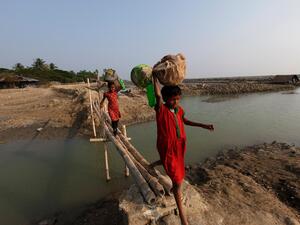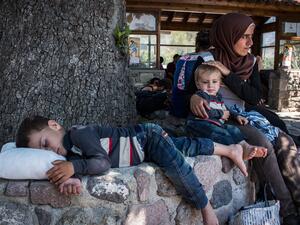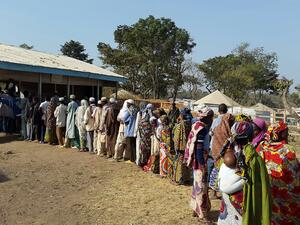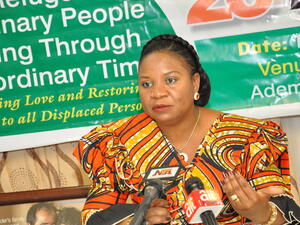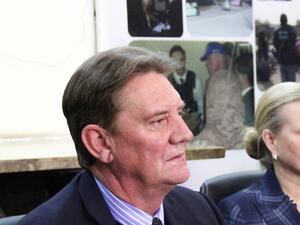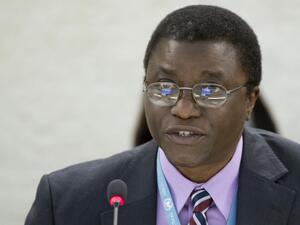Q&A: In refugee situation spanning decades, one ministry leads response
Q&A: In refugee situation spanning decades, one ministry leads response
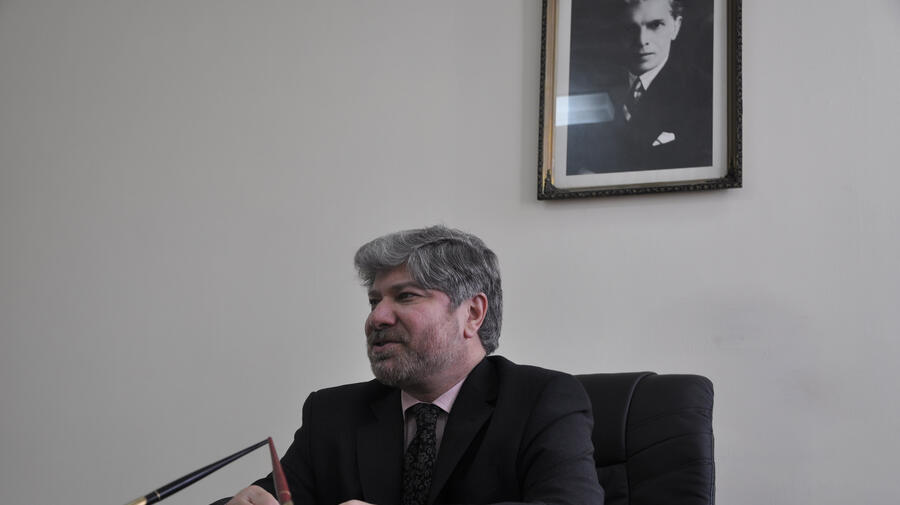
Dr. Imran Zeb, Joint Secretary of Pakistan's Ministry of States and Frontier Regions, with a photo of Pakistan's founder, Muhammed Ali Jinnah, in the background.
ISLAMABAD, Pakistan, May 26 (UNHCR) - For more than 30 years, Pakistan has been host to one of the largest and longest-running refugee situations in the world. Beginning with the Soviet invasion of Afghanistan in 1979, successive waves of Afghans have sought refuge in neighbouring Pakistan. After the fall of the Taliban in Afghanistan in late 2001, many again returned home. Still, some 1.7 million Afghan refugees remain in Pakistan. Responsibility for the Afghan population has always fallen on Pakistan's Ministry of States and Frontier Regions (SAFRON). Dr. Imram Zeb is SAFRON's Joint Secretary and he recently spoke with UNHCR's Tim Irwin in his office in Islamabad. Excerpts from the interview:
The Ministry of States and Frontier Regions was created in 1948 soon after the birth of Pakistan. What were its responsibilities at that point?
The ministry was established by the governor general [Pakistan's founder Muhammad Ali Jinnah] himself in July 1948. In the united India there had been princely states so when it was divided into Pakistan and India some of the princely states came to Pakistan. The Ministry of States and Frontier Regions was created to look after the affairs of those states. Another important aspect was the frontier regions, what we refer to today as the Federally Administered Tribal Areas (FATA). Later on, of course, the issue of Afghan refugees was made the responsibility of the ministry in 1980.
When the first Afghan refugees began arriving in Pakistan following the Soviet invasion in 1979, what was SAFRON's role?
Afghan refugees would cross over the Afghanistan-Pakistan border, so the first hosting place for the refugees was the tribal areas. The government of the day decided that our ministry would be the proper one to deal with this influx. Nobody knew then that we would be receiving millions of Afghans and that they would move throughout the country. Initially, we were only looking at settling the Afghans in the border areas. That included the establishment of camps, the provision of shelter, food and other basics. A request was then made to UNHCR and the international community for assistance and that is how our relationship began.
More than 30 years later, and Pakistan continues to host nearly two million Afghan refugees. How would you describe the current situation?
Before talking about the Afghan situation today, I should also highlight a few important aspects from its background. From 1980 to 1990 we had this influx of refugees and the response was to receive them, to provide shelter and to establish camps. In 1990, we registered 3.2 million Afghan refugees in Pakistan. If you then look at the repatriation trends, you see that between 1990 and 2000 over two million Afghans went home. After 2002 [following the fall of the Taliban in Afghanistan], 3.8 million more Afghans repatriated. So the total number of Afghans who have returned home, most of them with UNHCR assistance, is around 5.8 million. When you compare the total recorded influx of Afghans into this country, which is 4.4 million, and the total number of returns, which as I said is 5.8 million, you can see that the numbers don't really add up. So it's clear that not all Afghans in Pakistan are refugees.
For years, our strategy was focused on the continued large-scale repatriation of Afghan refugees. But in recent years the numbers of Afghans returning home have declined significantly.
So we have developed a new strategy, which is very ambitious, but I believe, also very achievable. The strategy, called the Afghan Management and Repatriation Strategy, for the first time adds the word management to the Afghan issue in Pakistan. The preferred solution among the governments of Pakistan, Afghanistan and UNHCR, is still the voluntary repatriation of people back to their homeland in dignity and safety. At the same we all realize that the situation inside Afghanistan will not allow all Afghans to return home in the near future. So we have come up with a strategy for the temporary management of Afghans inside Pakistan. For that we will introduce a flexible visa regime where Afghans will be given renewable visas for skilled and unskilled labour, for doing business in Pakistan, for education purposes as well as for health and other reasons. The program will help us to manage the population of Afghans inside Pakistan. People who fall under the mandate of UNHCR and who are considered refugees will continue to be looked after as refugees in Pakistan.
How are your ministry and UNHCR continuing to work together to assist Afghans?
We and UNHCR go a long way back. UNHCR and the World Food Programme were the first UN agencies to respond to our appeal for assistance back in 1980. So we have worked together from the purely humanitarian response to Afghan refugees to today's approach of managing the population.
But our work with UNHCR has not just been on the issue of Afghan refugees. UNHCR helped us to respond to the 2005 earthquake which caused so much devastation. In 2009 UNHCR was there to assist with the internal displacement caused by law enforcement operations in the Swat valley during which two to three million people were displaced. And UNHCR was again at the forefront of the response to the recent floods which affected much of the country. So UNHCR has been a very close partner for us.
How do you see the Afghan situation in Pakistan evolving?
I think it's important to move from thinking of Afghans in Pakistan as purely a refugee issue to one which is viewed as a broad-based migration and economic issue. We have to keep in mind that we still have Afghan refugees in this country, but we also have Afghans who are here for reasons other than fear of persecution. For us the implementation of the Afghan Management Strategy is imperative.



